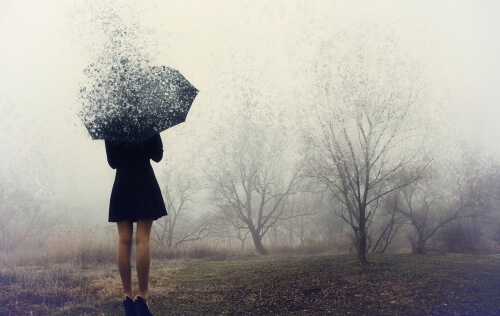When you’re feeling intense grief, there’s an interaction of a group of emotions that can alter its appearance. This means that, although every case is different, you might confuse grief with depression. In fact, both realities can sometimes coexist. That said, there are certain characteristics that can help you define what you’re feeling. Among them are pangs of grief.
Grief is the natural psychological response to the loss of a valued presence. It’s a universal, healthy, and necessary reaction that arises from the sudden absence of an important element in your life. It not only occurs as a result of the death of someone close or a love breakup. It can also be triggered by the loss of a friendship, a job, or a stage of your life that you’ve left behind.
Grief involves emotions of sadness, anger, apathy, anxiety, confusion, denial, etc. The range is wide and many of them also appear in depressive disorder. However, the way in which you experience these emotions in each case is different. We show you why.
Grief and depression: how are they different?
When you see, talk to, or spend time with a grieving person, you may think that they’re depressed. Indeed, there are several common manifestations in both conditions. For example, sadness and crying, feeling demotivated, or a tendency to isolation and reflection.
Nevertheless, there are important differences :
- With grief, personal self-esteem is often intact. On the other hand, with depression, there are feelings of worthlessness and self-devaluation.
- Depression breeds self-criticism, pessimistic rumination, and hopelessness. The possibility of feeling good again in the future isn’t even considered. In grief, there can be optimism and hope.
- When you experience a loss, the predominant feeling is one of emptiness and your worries revolve around that absence. In a depressive disorder, the negative cognitive content isn’t concrete and sadness, frustration, and the inability to experience pleasure are felt.
- With grief, the passage of time helps to mitigate the pain and these negative effects vary in intensity over the months. On the other hand, in the case of depression, without treatment, the depressed mood lasts for a long time.
In addition to the above differences, is the way in which negative emotions are presented. Or the so-called pangs of grief.
Pangs of grief: pain in waves
A person with a depressive disorder experiences feelings of continuous sadness and hopelessness. Apathy and demotivation become their constant companions. In the case of grief, this pain occurs in waves, pangs that come, hurt, and go away, only to reappear later.
These pangs are associated with memories of the deceased, the ex-partner, or whatever’s been lost. When those memories come knocking on the door, negative emotions wash over you like a wave. They might be feelings of sadness for your loss or anguish for not knowing how to move on. Or they could be feelings of guilt for having left something unfinished, or not having known how to take advantage of what you had. Whatever the case, these feelings aren’t permanent.
However, when you’re grieving, you’re still able to experience moments of happiness, tranquility, or well-being. Even in these times of sadness, absence, and emptiness, you can enjoy a conversation with friends, a hobby, or the present moment.
Pangs of grief can come at any time, be more or less intense or prolonged, but they don’t prevent the existence of those pain-free moments.

The pain that resurfaces with time
This kind of discontinuity can confuse you if you’re recovering from a loss, but grief isn’t a linear process. Although it’s generally accepted that there are several stages of grief, they don’t necessarily follow each other in an orderly way. In fact, sometimes they overlap and you may even go back to a previous one.
Therefore, when, after a long period of apparent calm and well-being, pangs of grief reappear, you get scared. After all, you seemed to be fine, you were moving forward, why do you feel this way again? These pangs of grief can often appear with the same intensity as in the beginning, even though you really felt you’d turned the page.
If it happens to you, don’t be afraid, you probably haven’t gone back to square one. It’s all part of the process. There’s no set time for a full recovery. If a memory suddenly creeps back into your mind, and a pang of grief washes over you, allow yourself to feel it without judgment or reproach. It’s completely natural. We all heal at our own pace.
The post Pangs of Grief: What Are They and Why Do They Occur? appeared first on Exploring your mind.



















Comments